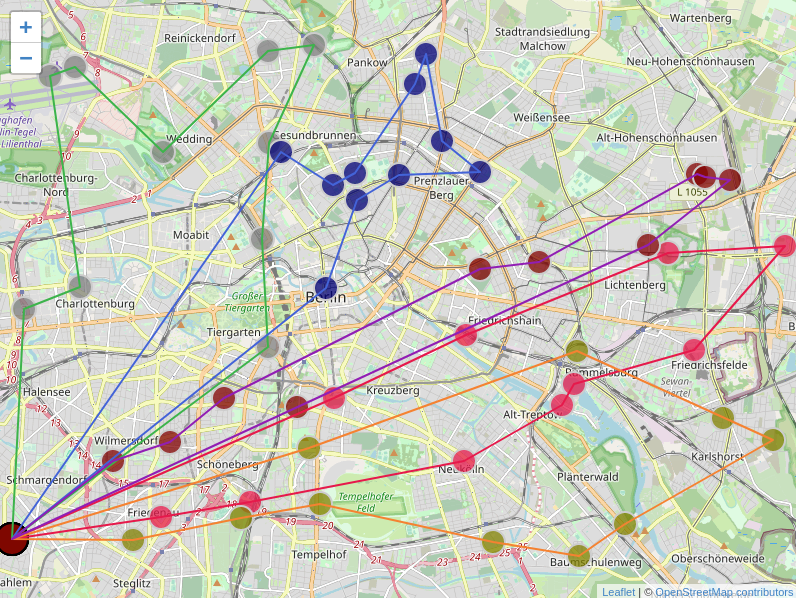This project provides the way to solve multiple variations of Vehicle Routing Problem known as rich VRP. It provides custom hyper- and meta-heuristic implementations, shortly described here.
If you use the project in academic work, please consider citing:
@misc{builuk_rosomaxa_2021,
author = {Ilya Builuk},
title = {{A new solver for rich Vehicle Routing Problem}},
year = 2021,
doi = {10.5281/zenodo.4624037},
publisher = {Zenodo},
url = {https://doi.org/10.5281/zenodo.4624037}
}
Although performance is constantly in focus, the main idea behind design is extensibility: the project aims to support a wide range of VRP variations known as Rich VRP. This is achieved through various extension points: custom constraints, objective functions, acceptance criteria, etc.
For general installation steps and basic usage options, please check next sections. More detailed overview of features is presented in A Vehicle Routing Problem Solver Documentation.
You can install vrp solver using three different ways:
The fastest way to try vrp solver on your environment is to use docker image (not performance optimized):
- run public image from
Github Container Registry:
docker run -it -v $(pwd):/repo --name vrp-cli --rm ghcr.io/reinterpretcat/vrp/vrp-cli:1.13.0- build image locally using
Dockerfileprovided:
docker build -t vrp_solver .
docker run -it -v $(pwd):/repo --rm vrp_solverPlease note that the docker image is built using musl, not glibc standard library. So there might be some performance
implications.
You can install vrp solver cli tool directly with cargo install:
cargo install vrp-cli
Ensure that your $PATH is properly configured to source the crates binaries, and then run solver using the vrp-cli command.
Once pulled the source code, you can build it using cargo:
cargo build --release
Built binaries can be found in the ./target/release directory.
Alternatively, you can try to run the following script from the project root:
./solve_problem.sh examples/data/pragmatic/objectives/berlin.default.problem.json
It will build the executable and automatically launch the solver with the specified VRP definition. Results are stored in the folder where a problem definition is located.
You can use vrp solver either from command line or from code:
vrp-cli crate is designed to use on problems defined in scientific or custom json (aka pragmatic) format:
vrp-cli solve pragmatic problem_definition.json -m routing_matrix.json --max-time=120
Please refer to getting started section in the documentation for more details.
If you're using rust, then you can simply use vrp-scientific, vrp-pragmatic crates to solve VRP problem
defined in pragmatic or scientific format using default metaheuristic. For more complex scenarios, please refer to
vrp-core documentation.
If you're using some other language, e.g java, kotlin, javascript, python, please check interop section in documentation examples to see how to call the library from it.
The project consists of the following parts:
- vrp solver code: the source code of the solver is split into four crates:
- vrp-core: a core crate with various metaheuristic building blocks and its default implementation
- vrp-scientific: a crate with functionality to solve problems from some of scientific benchmarks on top of the core crate
- vrp-pragmatic: a crate which provides logic to solve rich VRP using
pragmaticjson format on top of the core crate - vrp-cli: a crate which aggregates logic of others crates and exposes them as a library and application
- docs: a source code of the user guide documentation published here. Use mdbook tool to build it locally.
- examples: provides various examples:
- data: a data examples such as problem definition, configuration, etc.
- json-pragmatic: an example how to solve problem in
pragmaticjson format from rust code using the project crates - jvm-interop: a gradle project which demonstrates how to use the library from java and kotlin
Experimental.

